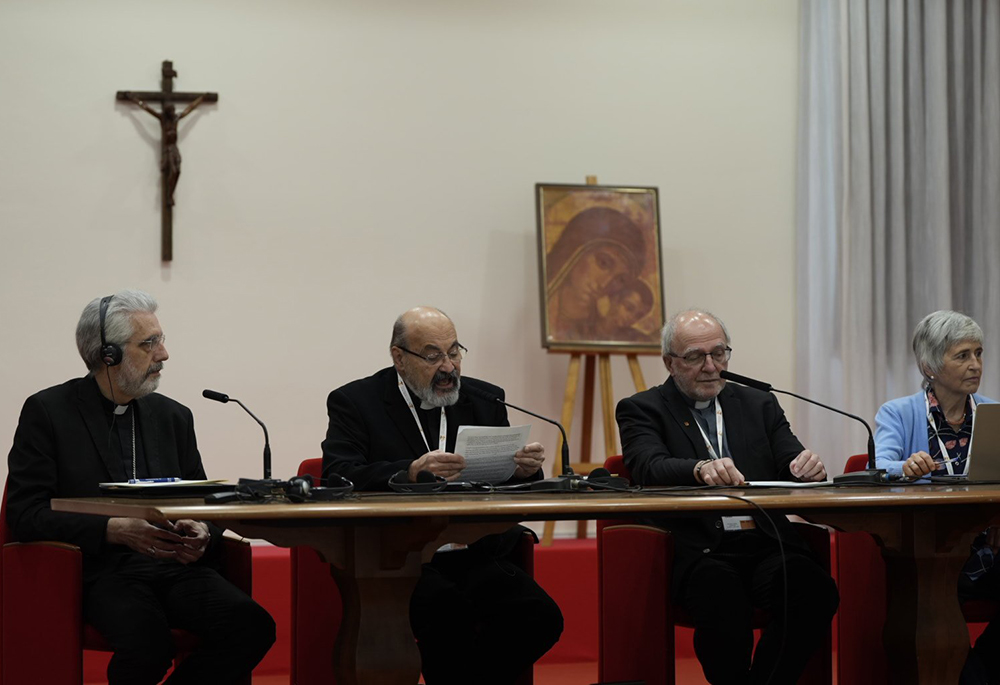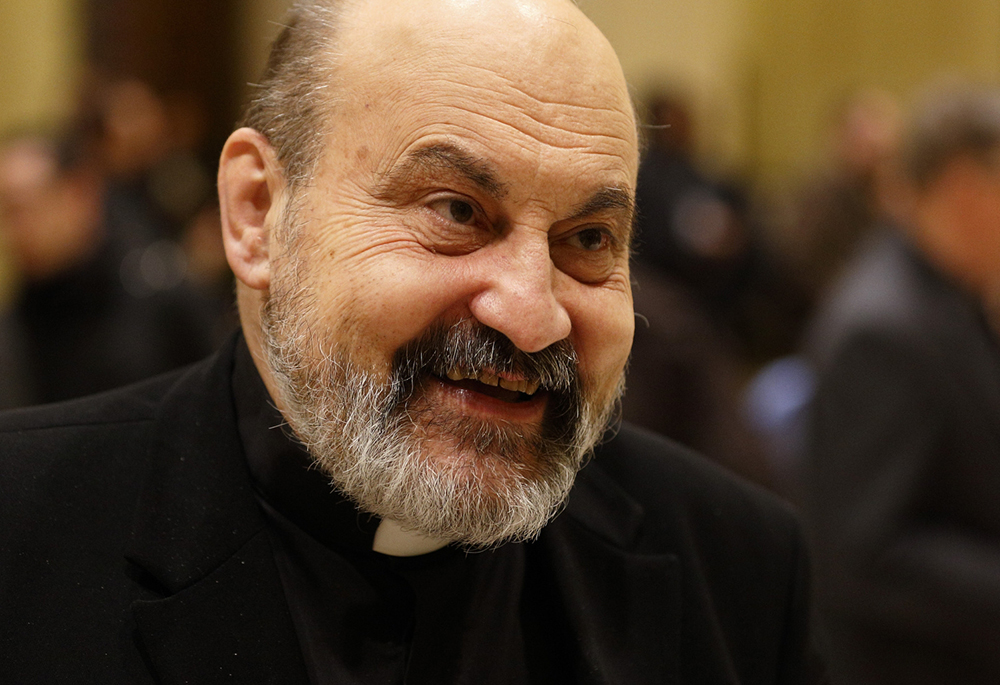
Fr. Tomas Halik, second from left, speaks at a meeting of parish priests April 29 at Sacrofano, outside of Rome. Other speakers include, from left: Bishop Luis Marín de San Martín, synod undersecretary; Canadian Fr. Gilles Routhier; and María Lía Zervino, sociologist and former president of the World Union of Catholic Women's Organizations. (CNS/Courtesy of the Synod of Bishops)
Catholicism must rid itself of the "heresy of triumphalism" if it is to become more synodal and better able to evangelize in a secular age, according to noted Czech theologian and philosopher Fr. Tomas Halik.
"We see ourselves as a societes perfecta," or a perfect society, that is too self-sufficient, said Halik, who was recently tapped by the Vatican's synod office to help lead an April 29-May 2 gathering for some 200 parish priests from all over the world.
The gathering was organized in response to concerns that Pope Francis' synod on synodality included only a few parish priests among the more than 400 delegates that participated in the first session of the assembly in October 2023.
During a May 2 interview with National Catholic Reporter, Halik praised Francis' synodal efforts and his commitment to root out a culture of clericalism, where priests see themselves as more powerful than the laity.
But, he said, he would also point to "ecclesial triumphalism," which he said is a prideful, widespread attitude defined by a Catholicism that is closed off from the world around it.
In an address to the parish priests in attendance at the synodal gathering, Halik lamented that "some Christians, alarmed by the rapid changes of the world, want to make the church an island of unchanging certainties."
"There are still places where the parish priest sees himself as the pope of his parish. But the church confers the gift of infallibility on only one of its members, and then only under strictly limited conditions," he continued. "And if even a pope relies on several consultative councils to help him make his decisions, how much more should a parish priest listen to those he has been sent to serve?"
'There are still places where the parish priest sees himself as the pope of his parish. But the church confers the gift of infallibility on only one of its members, and then only under strictly limited conditions.'
—Fr. Tomas Halik
Halik told NCR that he was encouraged by the open and frank discussions that took place during the four-day gathering, but he said that it is evident that the journey to become a more synodal church is a "multispeed" endeavor.
"Some countries are very well prepared for radical reforms and others are not," he said. "It depends on the culture."
While he said that there were candid conversations about a range of issues, including LGBTQ inclusion, married priests and other ministries, Halik also acknowledged that there are "differences between continents, but also inside countries."
Part of the solution to resolving these tensions, he believes, is greater decentralization in the church and both spiritual and structural reforms.
And reform, according to Halik, is nothing to be feared.
Advertisement
Building off of his latest book, The Afternoon of Christianity: The Courage to Change, the Czech priest said there have been many reformations throughout church history with varying levels of success. Even so, he insists that God has been journeying with — to use the language of the Second Vatican Council — "the people of God" throughout every era, including this rapidly changing one.
"Vatican II was a great moment, preparing the church for the modern age," he said. "But it came at the time that modernity was ending and we are now in a postmodern age."
In this era, he said, there are crises of globalization, democracy and increasing populism and the church is facing a "crisis of credibility," especially because of its own self-inflicted failings to root out clergy sexual abuse, psychological abuse and other forms of abuse.
"I hope there is potential in this idea of synodality to be prophetic for the future," said Halik, adding that he believes there is — particularly when it comes to engaging the "nones," spiritual seekers who are not affiliated with institutional religion. Part of this, he said, must result in the church becoming more ecumenical and embracing its "catholicity" — engaging what Francis' outlines in his 2020 encyclical Fratelli Tutti as all people of goodwill.

Fr. Tomas Halik is pictured at a conference titled "Renewing the Church in a Secular Age," at the Pontifical Gregorian University March 5, 2015, in Rome. (CNS/Paul Haring)
Here, Halik draws on his own experience: As a convert to the faith at age 18, he was already working as a licensed psychotherapist in Prague when he began clandestinely studying theology and was eventually secretly ordained.
"Even my mother was not allowed to know I was a priest!" he recalled, noting that he never had any formal seminary formation and spent significant time in his early ministry working with alcohol abusers and drug users.
For 11 years, he worked underground, until the fall of communism in Eastern Europe, eventually becoming an adviser to Czech president Václav Havel and a friend to Pope John Paul II.
Halik laughed, however, as he recounted that over the years, several conservative Catholic groups in the United States have invited him to participate in various events and forums to stand in solidarity with their own self-declared religious persecution.
"There are some people unable to live without an enemy," he said. While Christians may not be "totally embraced" in western culture, he said comparisons to totalitarianism must absolutely be avoided.
And as for Christians who call for a withdrawal from secular society, he doesn't mince words: "It is anti-Catholic. Catholicism is openness, universality. This is sectarian."
"No wonder these people have an affinity for [Vladimir] Putin, [Viktor] Orban, etc.," he added. "This type of closed Catholicism always has an affinity with totalitarian and authoritarian systems. To choose this way is the self-castration of the Catholic Church."
'It is anti-Catholic. Catholicism is openness, universality. This is sectarian.'
—Fr. Tomas Halik, on Christians calling for withdrawal from secular society
Women's leadership
By contrast, the 75-year-old Halik has invested heavily in the synodal process — both as one of the leaders of the European continental assembly in February 2023 and now again through this global gathering of parish priests.
Reforms, he said, must happen step by step, with respect for the cultural context in which they are occurring.
After spending four days with parish priests, he said he sensed tremendous goodwill and openness, even if serious disagreements remain.
On responding to the synod's "urgent" call for expanding opportunities for women's leadership, Halik said there seemed to be a shared sense of this need, but without consensus on what this means.
Personally, he said he believes there are "more psychological reasons than theological reasons," against women's ordination to both the priesthood and the diaconate and said that relying on the argument that " 'Jesus chose just men' isn't persuasive."
"Jesus chose just the Jews," he added, before asking rhetorically: "Do we have a right to ordain Italians, Americans and Japanese?"
'He is not a progressive theologian, but he is a very wise pastor. He has empathy and humor, and an open heart, combined with the Jesuit strategy to go step by step.'
—Fr. Tomas Halik, on Pope Francis
Even so, Halik said the question must be respectfully considered and whatever is decided by the synod and eventually the pope, he believes it is "a sin against the Holy Spirit not to embrace the charism of women to proclaim the Gospel."
Ultimately, the synod process initiated by Francis, he said, is one that takes incredible courage.
"He is not a progressive theologian, but he is a very wise pastor. He has empathy and humor, and an open heart, combined with the Jesuit strategy to go step by step."
Halik said that there are those throughout the church — including in his home country — that are simply waiting for another pope to succeed Francis in hopes of a course correction.
"I think it is not possible," he said. "They are changes that are unchangeable and he has opened the way."







